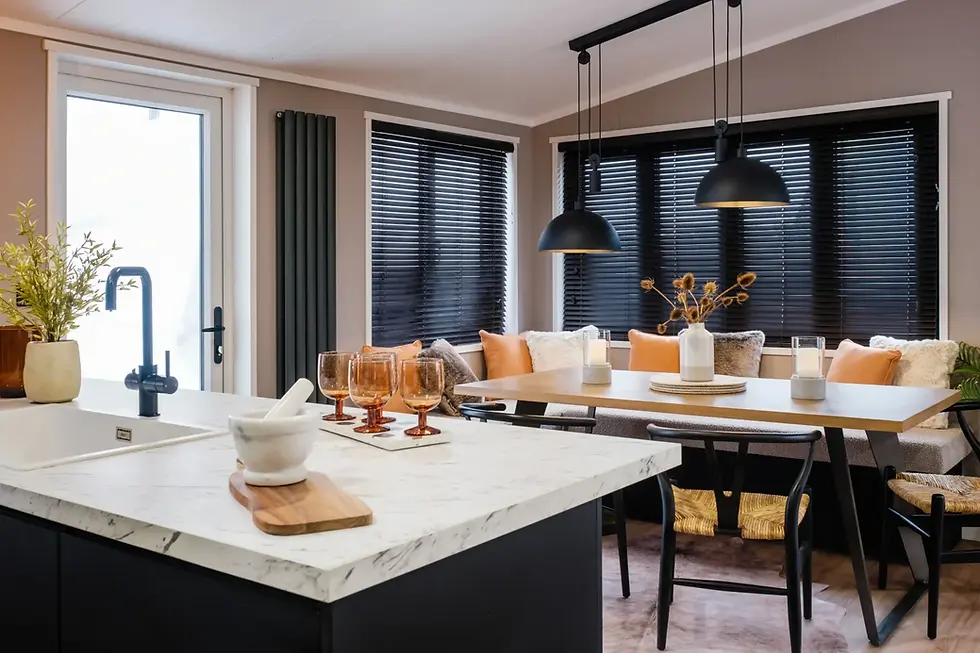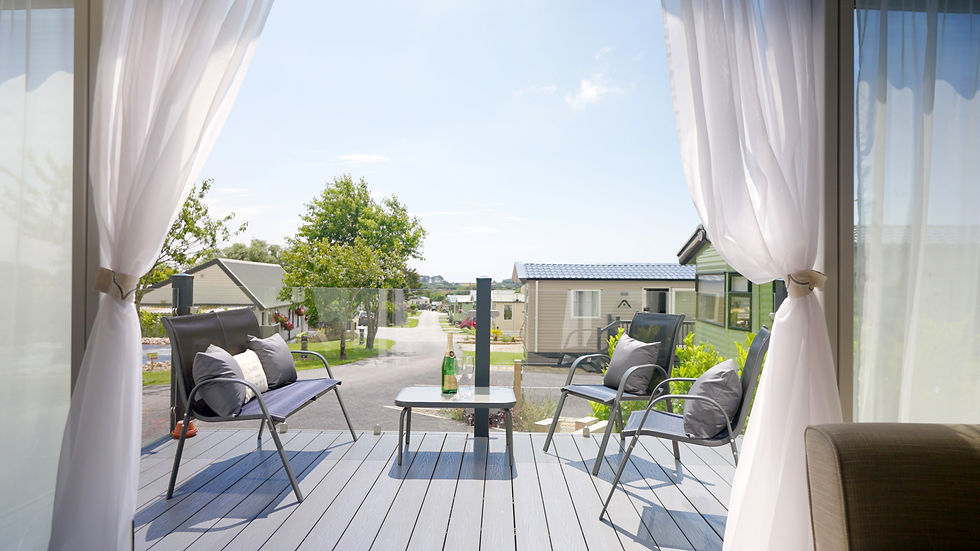What You Need to Know About Buying a Static Caravan - Important factors to consider
- Jodie

- Jul 9, 2025
- 5 min read
Buying a static caravan is a big decision – and an exciting one too. Whether you're dreaming of weekend getaways with the family, peaceful countryside escapes, or even a potential second income stream through subletting, owning a static caravan can be a fantastic lifestyle choice. But before you dive in, it’s important to understand exactly what buying a static caravan involves. From choosing the right location to understanding costs and ongoing responsibilities, this guide will walk you through everything you need to know.

What Is a Static Caravan?
A static caravan is a prefabricated holiday home designed to stay in one location, typically on a holiday park. Unlike touring caravans, static caravans aren’t designed to be towed around. Instead, they are transported and sited at a pitch of your choice, where they remain fixed. They come fully equipped with everything you need – kitchens, bathrooms, living areas, and bedrooms – providing a home-from-home experience.
Why Buy a Static Caravan?
There are lots of reasons people choose to buy a static caravan:
Convenience: Your own holiday home ready whenever you are.
Comfort: Modern static caravans are spacious, warm, and stylish.
Lifestyle: Enjoy nature, join like-minded communities, and make lifelong memories.
Freedom: No need to book hotels or compete for peak-season rentals.
Key Considerations Before Buying a Static Caravan
Before buying a static caravan, there are several important factors to think about:
1. Location, Location, Location
Where your static caravan is sited can make a big difference to your experience. Here are some things to think about:
Distance from home: How far are you willing to travel regularly?
Surroundings: Do you want a coastal view, countryside setting, or lakeside pitch?
Local amenities: Is there a shop, pub, or activities nearby?
Holiday park facilities: Pools, clubs, restaurants, and entertainment might be important to you.
2. Choosing the Right Holiday Park
The holiday park you choose is just as important as the caravan itself. Things to look for include:
Park rules and culture: Is it family-friendly, pet-friendly, quiet, or social?
Season length: Some parks are open year-round; others close for part of the year.
Pitch fees: These vary widely depending on park location and facilities.
Resale options: Can you sell the caravan on-site later?
3. New vs Pre-Owned Static Caravans
Buying a static caravan new means you can often customise finishes and benefit from warranties. However, pre-owned caravans are more affordable and may already be sited on a desirable pitch. Things to consider:
Condition: Always inspect second-hand caravans or ask for a survey.
Included extras: Pre-owned units may come with decking, furniture, or appliances.
Price: A new caravan can cost from £40,000 upwards. Used ones start from around £10,000.
4. The Cost of Buying a Static Caravan
It’s not just the initial purchase price you need to think about. Here are other common costs:
Site fees: Also known as pitch fees, these cover your spot on the park and access to facilities. Expect anywhere from £2,000 to £7,000+ per year.
Utility charges: Gas, electricity, and water charges are either metered or charged annually.
Insurance: Static caravan insurance is essential to protect your investment.
Maintenance: Regular upkeep, winterisation, and possible repairs.
Rates and licences: Some parks pass on local authority charges or require licensing fees.
Buying a Static Caravan: Step-by-Step Guide
Here's how the buying process usually works:
Step 1: Research Holiday Parks
Start by identifying regions you love to visit and then research holiday parks in that area. Visit the parks in person, talk to current owners, and ask lots of questions.
Step 2: Set a Budget
Factor in the full cost of ownership, including pitch fees and running costs. It’s a good idea to be clear on what you can comfortably afford both upfront and each year.
Step 3: Choose Your Caravan
Select the model that fits your needs and budget. Consider:
Step 4: Understand the Agreement
Before buying a static caravan, you'll sign a licence agreement or pitch agreement with the holiday park. Read this carefully and look for:
Length of licence (often 10-20 years)
Resale and subletting rules
What happens if you leave the park
Park closure periods and maintenance responsibilities
Step 5: Make Your Purchase
Once you’re happy with the caravan and the site, it’s time to complete the purchase. This may involve:
Paying a deposit
Signing the pitch licence
Arranging finance if needed
Paying for siting and connection
Step 6: Get Ready to Move In
Once sited and connected, you’ll receive keys and a handover. It’s a good idea to:
Arrange insurance cover
Get a safety check on gas and electric systems
Stock your caravan with essentials
Should You Sublet Your Static Caravan?
Many static caravan owners choose to sublet their holiday home to offset running costs. Some parks offer managed letting schemes, while others allow private subletting. Consider:
Is your park open to subletting?
Will you handle bookings yourself or use a letting agent?
How much rental income can you realistically expect?
Do you need specific insurance?
The Lifespan of a Static Caravan
Most holiday parks impose a maximum age limit on caravans, often around 15 to 25 years. After this, you may need to upgrade or move the caravan off-site. However, with proper maintenance, static caravans can last many years and retain good value.
Pros and Cons of Buying a Static Caravan
Pros:
Your own personal holiday home
Spontaneous getaways
Potential for subletting income
Belonging to a like-minded community
Cons:
Depreciation over time
Ongoing running costs
Park rules and limitations
Limited resale value compared to traditional property
Tips for First-Time Buyers
Visit multiple parks before committing
Speak to current owners about their experience
Be realistic about how often you’ll use it
Budget for worst-case costs, not just best-case scenarios
Understand exactly what’s included in the purchase price
Common Mistakes to Avoid When Buying a Static Caravan
Rushing into a decision: Always do your research.
Ignoring the small print: The pitch licence outlines your rights and obligations.
Underestimating costs: Don't forget about site fees, insurance, and repairs.
Not checking the resale policy: Some parks don’t allow third-party sales.
Final Thoughts
Buying a static caravan can transform the way you holiday, offering the freedom to escape whenever you like and the comfort of having your own place to unwind. But it’s not a decision to take lightly. Understanding the full picture – from purchase price and pitch fees to resale rules and maintenance responsibilities – is key to making a smart, enjoyable, and sustainable choice.
If you're thinking about buying a static caravan, explore our detailed reviews and video tours on At Your Leisure to help you find the perfect match. We independently review the latest models, provide honest feedback, and showcase some of the best parks across the UK.
Explore. Compare. Buy with Confidence.
At Your Leisure is here to guide you every step of the way. Keep reading, watching, and exploring as you plan your next big adventure. For your free Buyers Guide, click here.



Comments